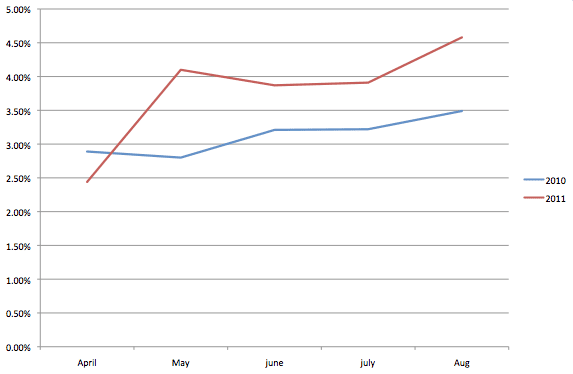If you think stewarding donors is expensive, try ignoring their needs instead
Rapidata has released their August direct debit cancelation figures and they don't look particularly good.
At 4.58% they are the highest seen for August since the monitoring of regular giving trends started back in 2003.
In a worrying commentary, Rapidata's Managing Director, Scott Gray, says he expects to see cancellations exceed 5% in September. But he also offers some sensible advice on how to tackle this rather frightening downturn...
"If you are stalling a stewardship programme or have communications, appeals or campaigns on hold, it's time to act."
I have to agree. When we look at this data alongside appeal results, we see that the recession which the individual giving sector has avoided for so long seems to have finally arrived.
Throwing up our hands in horror is obviously an option, but I'd suggest that there are better ways to tackle the effects of the economic slide. Here are three ideas that have worked for me:
1. Drop your 'luxury' communications. By that I mean those communications which might please charity staff, but do nothing for donors. Self-congratulatory, navel-gazing newsletters that focus on policy issues and getting over the 'brand' message would be first on my list.
Instead, use your newsletters to show donors what you have done with their money and reinforce the reasons why you continue to need their support. At the very minimum re-think your headlines. Try and turn each into a mini-appeal. You can read more about this approach here.
2. Re-double your efforts to find great stories. There is only so much that even the greatest writer can do with a few paragraphs describing the broad nature of a programme supported with two or three weak quotes. Instead invite your creative partners to visit your programmes and meet beneficiaries.
When I visit projects, I always try to find time to ask the staff I meet three questions. The answers have delivered a number of fantastic fundraising packs.
If a donor gave you £5, how would you use it?
If a donor gave you £500, how would you use it?
If a donor couldn't volunteer or afford a gift but wanted to do something, what would you ask them to do?
3. Ask donors for what they can afford. Look at your data and identify donors who have given you a large gift within the last three or four years. In your next appeal, remind them of just how generous they were and how important the gift was (if you can, tell them how you used it) and ask them if they can match it.
I'd also review your uplift strategy. Instead of asking donors to increase their gift by 10% or 20%, try asking those who aren't responding for 10% or 20% less.
The greatest problem we face as fundraising becomes harder is fear. Cutting back is easy, but pointless. Instead, look at every single communication you send to your donors (or potential donors) and ask how it strengthens your relationship with them. Give real consideration to removing anything that doesn't bring donors closer by answering their needs.
Not only will that ensure you optimise your fundraising efforts whilst times are tough, but it will leave you very well placed when finances start to improve.
Tags In
Related Posts
1 Comment
Comments are closed.
The Essentials

Crack the Code to Regular Giving: Insights, Strategies, and a Special Giveaway!

‘Tis Halloween. Keep to the light and beware the Four Fundraisers of the Apocalypse!

Why do people give? The Donor Participation Project with Louis Diez.

A guide to fundraising on the back of a postcard

What does the latest research tell us about the state of fundraising?







Mark
Many thanks for this post. I agree wholeheartedly with your ideas particularly re-doubling efforts to re-inforce stories.
Thanks again.
Jensen